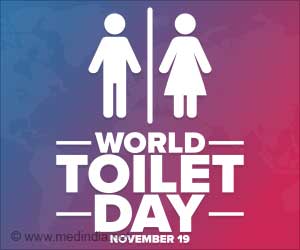among its global citizens in 2013.
Every year, UN-Water – the United Nation’s coordination mechanism on water and sanitation – sets the theme for the day of the celebration. In 2021, the theme is
This theme focuses on sustainable development goal 6 (SDG6), according to which the organization aims to provide sanitation facilities to all human beings on Earth by the year 2030.
The campaign draws attention to the fact that toilets and sanitation systems are underfunded, poorly managed, or neglected in many parts of the world, affecting health, economics, and the environment.
For women and girls, toilets at home, school, and work help them fulfill their potential and play their full role in society, especially during menstruation and pregnancy.
Poor sanitation contaminates drinking-water sources, rivers, beaches, and food crops, spreading deadly diseases among the wider population.
Did you know?
- Nearly half the world’s population – 3.6 billion people live without a safe toilet.
- Globally, at least 2 billion people use a drinking water source contaminated with feces.
- Every day, over 700 children under five years old die from diarrhea linked to unsafe water, sanitation, and poor hygiene.
- 494 million people still practice open defecation.
-
1 in 3 of the global population lacks basic handwashing facilities at home. -
For every $1 invested in basic sanitation up to $5 is returned in saved medical costs and increased productivity, and jobs are created along the entire service chain. -
Achieving universal access to sanitation by 2030 will require a four-fold increase
in current rates of progress.
Spread the Message
Ahead of the day, UN-Water launches a global campaign on www.worldtoiletday.org and social media (#WorldToiletDay).
The UN has created new postage stamps for World Toilet Day 2021. The three new designs depict the most important ways toilets, water and hygiene add value to our lives.
Individuals, organizations, governments, companies, schools, and many other actors support the day by using official messages and assets, or organizing their own World Toilet Day activities.
Help the World Health Organization (WHO) develop a published research agenda by participating in a survey before 12 November.
To mark World Toilet Day, the International Labor Organization (ILO), World Bank, World Health Organization, and WaterAid launched a report highlighting the unsafe and undignified working conditions of sanitation workers around the world.
Young people across the world (aged between 19 and 24) are asked to produce a video or any other digital content on “the human rights to water and sanitation of peoples living close to the nature”, such as indigenous peoples, peasants, farmers, fishers, hunters, livestock rearers, and traders.
Even though sanitation is a human right recognized by the United Nations, it needs massive investment and innovation to quadruple progress along the ‘sanitation chain’, from toilets to the transport, collection, and treatment of.
Governments must listen to the people who are being left behind without access to toilets and allocate specific funding to include them in planning and decision-making processes.
References:
- World Toilet Day
19 November – (https://www.worldtoiletday.info/) - World Toilet Day 2021
– (https://www.un.org/en/observances/toilet-day) - World Toilet Day 2021
– (https://www.gwp.org/en/About/more/Events-and-Calls/2021/world-toilet-day-2021/) - World Toilet Day
– (https://www.worldtoilet.org/what-we-do/world-toilet-day/)
Source: Medindia



